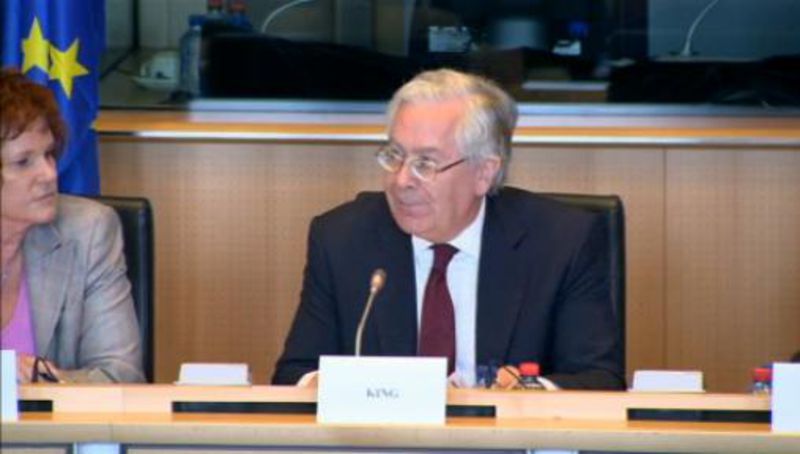Eurostat and the Commission investigate Greece
euinside, February 16, 2010
 Eurostat (the European Statistics Service) has requested the Greek government to provide all documents related to a deal with Greek state debt in 2001 with the investment bank Goldman Sachs, the Monetary and Economic Affairs Commissioner Olli Rehn announced in the end of the meeting of EU finance ministers - ECOFIN. Aside from Eurostat, the European Commission will also deeply investigate the information, spread by the New York Times a few days ago.
Eurostat (the European Statistics Service) has requested the Greek government to provide all documents related to a deal with Greek state debt in 2001 with the investment bank Goldman Sachs, the Monetary and Economic Affairs Commissioner Olli Rehn announced in the end of the meeting of EU finance ministers - ECOFIN. Aside from Eurostat, the European Commission will also deeply investigate the information, spread by the New York Times a few days ago.
According to the information, in 2001 a little while before Greece joined the euro area, the bank agreed to give the country a loan of several billion dollars - a deal not announced publicly. With this deal, presented as buying of currency and not as a loan, Greece ostensibly complied with the budgetary deficit and debt rules of the eurozone (according to the Stability and Growth Pact the budgetary deficit should not exceed 3% of GDP and the debt - 60%). At the moment the budgetary deficit of Greece is over 12% and the debt surpassed its GDP - 113%.
The Commission announced on Monday that Eurostat was not aware at the time with the Greek debt's transactions. Spain, which is presiding the European Union and is part of the PIGS countries (Portugal, Ireland, Greece and Spain), also has serious financial troubles. The Spanish finance minister Elena Salgado however denied banks like Goldman Sachs to have had attempted to buy Spanish debt nor the Spanish authorities ever tried to hide such deals. She also added that even if the bank had such intentions, the government in Madrid would have not agreed.
Because of this problem the Commission is initiating an infringement procedure against the Greek national statistic agency which is under serious reform so as to become independent. Separately, Olli Rehn recalled the decision of the Commission from Monday to prepare a proposal to the European Council and the Parliament for a significant increase of the European Statistics Service's rights. These rights will be extended to auditory and will authorise Eurostat to, practically, check the data, provided by national statistics. Mr Rehn added that Eurostat so far had no information that the Goldman Sachs-Greece case had spread to other euro area members. This information should also be checked, he underlined.
Regarding the Goldman Sachs case the former Enlargement Commissioner and now responsible for the monetary and economic affairs said that currently he was reading the book of the former American Treasury Secretary Henry Paulson who was also a chairman and executive director of Goldman Sachs. In it Paulson wrote that financial ethics and morale were the basics of financial stability. Olli Rehn expressed hope that this did not remain only in his book and that the bank had actually stuck to banking ethics.
In today's session of ECOFIN the new Internal Market Commissioner also took part - the Frenchman with a long European experience Michel Barnier. He said that more transparency was needed, especially with regard to debt deals, the so called CDS (credit default swaps). This is an issue on which he and his team will work hard in the coming weeks so that everybody knew who is doing what. In the next couple of weeks Barnier will visit Washington and New York to discuss not only this but also the issue with financial regulation.
The issue of data credibility was essential at the meetings of the Eurogroup and ECOFIN yesterday and today. Last night the premier of Luxembourg who is also president of the Eurogroup Jean-Claude Juncker officially took the responsibility for the Greek case because, as he explained, it was during Luxembourg's Presidency in the first half of 2005 when ECOFIN rejected the proposal for giving Eurostat more rights. He even mentioned that it would not be a bad idea Eurostat to "go in each ministry and department to make checks". Given his strong sense of humour though it was not very clear whether he was joking or not.
But he again reminded that the biggest mistake was that no one paid good attention to the competitiveness imbalances. Nevertheless he called on financial markets to stop attacking Greece and added that he would not make any statements to calm the markets. Instead, the statement of Olli Rehn today was obviously directed to the markets: "All necessary measures will be taken to safeguard eurozone's stability but only if this is necessary. If there such a situation should appear, we have the means and the ways to react and the Commission stands ready to coordinate these actions".
 | © European Union
| © European Union | © European Union
| © European Union | © European Union
| © European Union